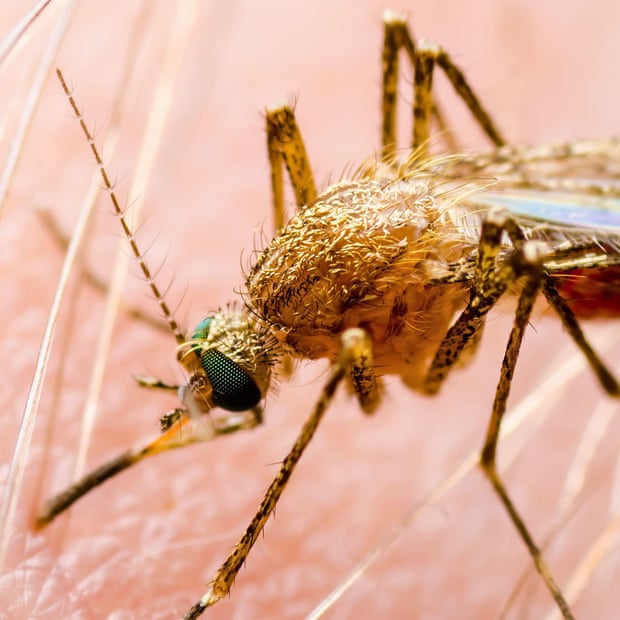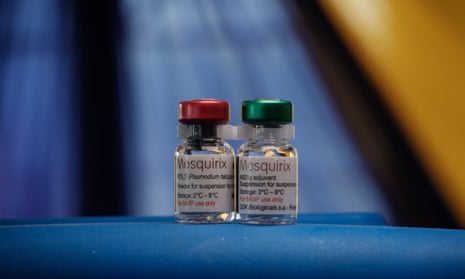Ghana has become the first country to approve a highly effective malaria vaccine developed at Oxford university in the UK.
The R21/Matrix-M vaccine, the first to exceed the World Health Organization’s target of 75% efficacy, has been cleared for use by Ghana’s Food and Drugs Authority in children aged 5-36 months, the group at highest risk of death from malaria.
Prof Adrian Hill, the director of the Jenner Institute, which is part of the Nuffield Department of medicine at Oxford University, said: “This marks a culmination of 30 years of malaria vaccine research at Oxford with the design and provision of a high efficacy vaccine that can be supplied at adequate scale to the countries who need it most.”
However, observers warned it was “no silver bullet” in the complex fight against the mosquito-borne disease. An estimated 619,000 people died from malaria in 2021, the vast majority of them children in sub-Saharan Africa, according to the WHO. In Ghana, where the disease is both endemic and perennial, an estimated 5.3m cases and 12,500 estimated deaths were recorded.
The WHO has yet to recommend the R21 vaccine for widespread use and until it does there is a question mark over the amount of international funding available for it. The vaccine’s phase 3 trial is ongoing, but earlier trials have shown efficacy levels of 77%, a level maintained after a single booster dose given a year later.
In contrast, the RTS,S vaccine, which the WHO recommended for use in a landmark move in 2021, has more modest efficacy levels.
The Serum Institute of India, the biotechnology giant that is manufacturing the R21 vaccine, said it has the potential to manufacture more than 200m doses annually.
Adar Poonawalla, the CEO of the Serum Institute, said the licensure of the vaccine by Ghanaian authorities was a significant milestone in the fight against malaria.
Q&AMalaria vaccines
Show

For about a century, scientists have been trying to find an effective vaccine against malaria. It has not been easy. There have been about 140 vaccine candidates and, so far, only one – GSK’s RTS,S – has been approved for widespread use. From next year, it is hoped, there will be another, named R21, courtesy of Oxford University.
In contrast to a relatively simple virus such as Covid-19, the malaria parasite is highly complex and, crucially, much bigger. “With malaria there are thousands of potential targets,” says Katie Ewer, professor of vaccine immunology at Oxford’s Jenner Institute.
So how does the Oxford vaccine work? Ordinarily, once a mosquito has bitten someone, the malaria parasite travels from their skin through the lymphatic system to the blood and finally to their liver, where it causes the infection that makes them ill.
Many previous vaccines have tried to target the parasite when it is in the blood, but by then, says Ewer, “that’s a very, very tall order.” What R21 does is target the parasite early in its lifecycle, just after a person has been bitten by a mosquito and before they get sick.
“R21 is trying to block the parasites before they get to your liver and set off infection,” says Ewer. “And that’s the mechanism for how it works.
"By targeting the earlier stage of the lifecycle," she adds, "there are fewer parasites for the vaccine to mop up, and there’s less diversity in the parasite at that stage as well.”
Lizzy Davies
“Developing a vaccine to greatly impact this huge disease burden has been extraordinarily difficult,” he said. “We remain steadfast in our commitment to scaling up production of the vaccine to meet the needs of countries with high malaria burden and to support global efforts towards saving lives.”
The promising vaccine performance has been hailed as a rare ray of light in a fight that has stalled in recent years. Progress against malaria has been imperilled by insecticide resistance that is reducing the effectiveness of bed-nets, parasitic resistance to commonly used drugs, and the arrival in Africa of an insecticide-resistant mosquito that thrives in urban settings.
Javier Guzman, the director of global health policy at the Center for Global Development, said that while it was exciting that R21 had been licensed for use in Ghana it did not mean donors or international vaccine procurers, such as Gavi, the vaccine alliance, would fund it.
“These agencies still require that the vaccine is considered safe, effective and quality assured by the WHO pre-qualification programme,” he said.
“Also, it is still uncertain if R21 is good value for money, especially when compared to other cost-effective malaria interventions that have not been fully deployed across endemic countries, such as insecticide-treated nets or indoor residual spraying.
“In other words, while the vaccine might be heralded as a huge win in the fight against malaria, it is no silver bullet, and there are important points to consider before the R21 vaccine is rolled out for wider use.”
